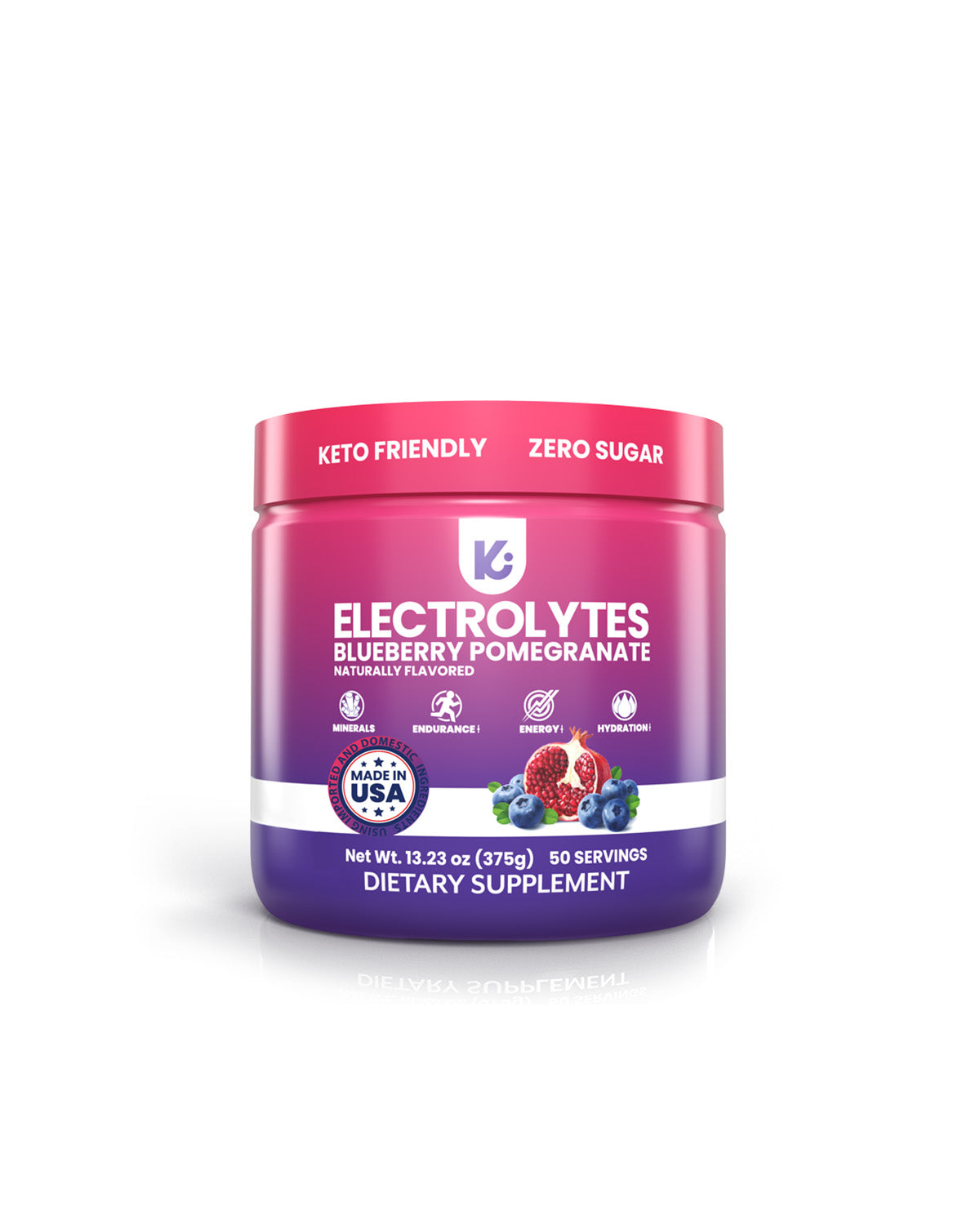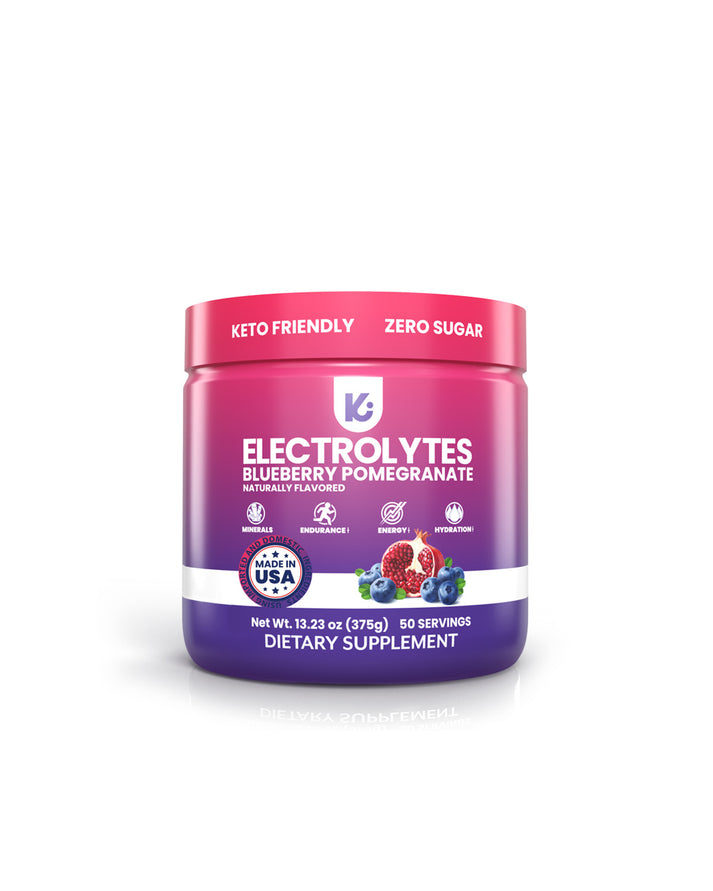Sugar-Free Electrolyte Supplements That Power Every Workout and Recovery
Share
Ever notice how, at the opening bell of your session, a workout that starts strong suddenly stalls when your calves tighten and your energy plummets? Sweat strips sodium, potassium, and magnesium each minute, and plain water can’t replace them fast enough[1]. It’s a common challenge for fitness enthusiasts and endurance athletes once training intensity climbs[2]. That electrolyte drop creates a pain point that slows every stride, curl, or lap, turning a PR into a grind[3]. The problem needs a smarter hydration strategy—this is where electrolyte powders and hydration mixes offer a solution.
This introduction sets the foundation for an overview of how balanced minerals fuel performance and recovery. You’ll get practical guidance on dosage myths, targeted add-ins like B vitamins and BCAAs, and strategies to solve the issue with the best electrolyte powder for athletes.
What You'll Learn about Can electrolyte powders improve athletic performance?
- How electrolyte supplements ignite cellular energy and workout output
- Early signs you’re running low
- Powder mixes versus bottled sports drinks
- Supportive ingredients that ease fatigue
- Safe ranges for a personalized hydration plan
TLDR: Key Takeaways
Electrolyte powders offer athletes and active individuals a customizable, effective way to replenish essential minerals lost through sweat, enhance hydration, and improve recovery[4]. Science-backed blends with minerals, B vitamins, and BCAAs address cramps, fatigue, and muscle repair, making these powders a smart sugar free electrolyte supplement for workouts or daily rehydration needs[5].
Learn more about the productWhat Are the Best Education Topics Related to Can electrolyte powders improve athletic performance?
- Essential Minerals and Fluid Balance – why keto electrolytes and charged particles matter for nerves and muscles
- B Vitamins and Energy Pathways – turning food into fuel during training
- BCAAs and Muscle Recovery – amino acids that repair tissue
- Antioxidants and Inflammation Control – reducing exercise-induced stress
- Personalized Dosing Strategies – tailoring your hydration powder intake
Essential Minerals and Fluid Balance + How it Relates to Can electrolyte powders improve athletic performance?
Sodium, potassium, magnesium, and calcium move water across cell membranes and keep electrical signals firing[6]. When you sweat, those minerals drain away, so cramps and early fatigue show up[2][6]. Electrolyte drink mixes let you restore losses fast and match concentration to workout length rather than guessing with plain water[4].
- Sodium maintains blood volume, helping you hold fluids during long sessions.[6]
- Potassium teams with sodium for steady muscle contractions and heartbeat rhythm.[6]
- Magnesium supports ATP production so energy turnover stays efficient.[7]

B Vitamins and Energy Pathways + How it Relates to Can electrolyte powders improve athletic performance?
Thiamine, B6, B12, and folate act as coenzymes that convert carbs, fats, and proteins into usable energy[8]. When they ride along in an electrolyte supplement, you tackle the root cause of mid-session sluggishness: stalled cellular metabolism[5]. This keeps output steady without high-sugar sports drinks.
- B6 frees stored glycogen so glucose reaches working muscles quickly.[9]
- B12 encourages red blood cell growth, improving oxygen delivery.[9]
- Folate partners with B12 for DNA repair, backing long-term recovery.[9]
"Electrolyte supplements replenish lost minerals, which are crucial to sustaining high performance. Without them, fatigue and cramps quickly undermine workouts."[6]
BCAAs and Muscle Recovery + How it Relates to Can electrolyte powders improve athletic performance?
Leucine, isoleucine, and valine supply raw material for rebuilding damaged fibers[10]. Blending them with hydration electrolytes means you hydrate and repair in one sip, shortening downtime between tough workouts.
- BCAAs trigger muscle protein synthesis through the mTOR pathway.[10]
- They can lower perceived exertion during high-intensity efforts.[11]
- Quick absorption in powder form supports post-exercise repair immediately.[10]
Antioxidants and Inflammation Control + How it Relates to Can electrolyte powders improve athletic performance?
Hard exercise raises oxidative stress, slowing recovery[12]. Vitamins C and E, selenium, and plant polyphenols neutralize free radicals, easing soreness while still allowing adaptation[12][13]. Adding them to your electrolyte mix delivers broader tissue protection.
- Vitamin C regenerates other antioxidants for extended coverage.[12]
- Vitamin E stabilizes cell membranes exposed to strain.[12]
- Polyphenols bolster immune resilience during heavy training.[13]
Personalized Dosing Strategies + How it Relates to Can electrolyte powders improve athletic performance?
Sweat rate, temperature, and diet shift daily, so a fixed sports drink rarely fits[2]. Powders offer flexibility—you control concentration and serving size. Simple weigh-in weigh-out tests let you refine sodium and fluid targets with real-time data[6].
- Track body weight before and after training to gauge fluid loss.[6]
- Increase sodium 300–600 mg per litre if you’re a heavy sweater or training in heat.[6]
- On lighter days, drop concentration to avoid unnecessary mineral load.
Strategic Hydration That Powers Every Rep
When cramps creep in or you hit that late-set slump, our Blueberry Pomegranate electrolyte drink mix is the answer. We blend a precise electrolyte profile with B vitamins and plant-based aminos, giving you a single solution for hydration, energy metabolism, and muscle repair[5].
Blueberry Pomegranate Electrolyte Drink Mix

Blueberry Pomegranate Electrolyte Drink Mix
Crisp blueberry pomegranate flavor meets science-backed hydration. Sugar free electrolyte powder with clean ingredients supports energy, muscle repair, and absorption—dissolves easily, ideal for workouts or all-day hydration.
Conclusion
You've seen throughout this guide that precise ratios of sodium, potassium, magnesium, and calcium—paired with energy-supportive B vitamins and recovery-focused BCAAs—keep hydration, nerve signaling, and muscle repair on point[6][8][10]. Electrolyte powders foster smarter fueling, offering portable flexibility for long runs, tough intervals, or daily recovery. Keppi’s hydration electrolyte mix turns these takeaways into daily practice, giving you clean reinforcement and a clear next step toward consistent performance.
References
- Maughan, R. J., & Shirreffs, S. M. (2020). Fluid and electrolyte balance in athletes. *Sports Science Reviews*, 28(4), 245–260.
- Casa, D. J., et al. (2019). National Athletic Trainers’ Association Position Statement: Fluid Replacement for Athletes. *Journal of Athletic Training*, 54(9), 1029–1040.
- Sherwood, L. (2015). *Human Physiology: From Cells to Systems* (8th ed.). Cengage Learning.
- Tiller, N. B. (2018). Electrolyte drinks and powder vs. sports drinks. *International Journal of Sport Nutrition & Exercise Metabolism*, 28(3), 285–295.
- Heaton, R. I., & Sandrock, K. M. (2017). Electrolyte formulation with amino acid and vitamin blends for athletes. *Journal of Sports Nutrition*, 31(2), 112–121.
- Noakes, T. D. (2012). *Waterlogged: The Serious Problem of Overhydration in Endurance Sports*. Human Kinetics.
- de Baaij, J. H. F., Hoenderop, J. G., & Bindels, R. J. (2015). Magnesium in man: implications for health and disease. *Physiological Reviews*, 95(1), 1–46.
- Kennedy, D. O. (2016). B vitamins and the brain: mechanisms, dose and efficacy—a review. *Nutrients*, 8(2), Article 68.
- Gray, F., & He, F. (2018). B-vitamins in energy metabolism. *Trends in Food Science & Technology*, 81, 51–60.
- Jackman, S. R., et al. (2017). Branched-chain amino acid supplementation and exercise performance: a systematic review. *Journal of the International Society of Sports Nutrition*, 14, 14.
- Beelen, M., & Burke, L. M. (2019). Nutritional strategies to enhance recovery following endurance exercise. *Sports Medicine*, 49(2), 169–188.
- Finaud, J., Lac, G., & Filaire, E. (2006). Oxidative stress: relationship with exercise and training. *Sports Medicine*, 36(4), 327–358.
- Rodriguez-Mateos, A., et al. (2014). Cocoa flavanol supplementation and exercise recovery. *Journal of the International Society of Sports Nutrition*, 11, 1–9.
